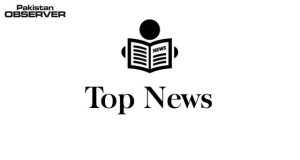Hassan Tahir
As the world grapples with an unceasing coronavirus pandemic, Washington and Beijing are engaged in trading barbs against each other, including accusations of having spread the virus deliberately. President Trump’s recent threat of consequences for China reflects the simmering resentment among American people who are worst affected with the pandemic causing roughly 40000 fatalities to date, along with over 22 million jobless claims, the highest in history.
Some Beijing officials have suggested that there might have been US military complicity in using Covid-19 as a biological weapon. Meanwhile, officials in Washington are calling it the “Chinese Virus” or “Wuhan virus,” further aggravating the situation.
The origin of the epidemic is yet to be ascertained, but one fact which is certain is that this virus is turning into another flashpoint between the US and China, miring both states in a Thucydide’s trap, a concept coined by American Philosopher DR. Graham Alison.
For him, “It was the rise of Athens, and the fear that this instilled in Sparta, that made Peloponnesian war inevitable.” The theory postulates that all rising powers challenge the established/status quo power that ultimately drags both sides on a collision course toward conflict.
Alison in his famous book Destined For War: Can America and China Avoid Thucydides Trap? picked sixteen historical cases where 12 ended up in catastrophic wars; whereas only four times did states manage to make adjustments that were comparatively peaceful.
The assertions made 2500 years back are still pertinent in the case of Sino-US power relation, where it is generally believed that China is on course to replace US global primacy. Covid-19 has created too much uncertainty to for us to tell whether previous trajectories are still to be followed, and the world stands at a new crossroads.
Covid-19 has brought the world to its knees, paralyzed economic activity, disrupted the global supply chain, closed the production lines and squeezed the consumer market. The impact this pandemic has made is far bigger than any previous peacetime crisis because its main target is human life and human economies.
After a tight lockdown of three months, China has started to open up its cities, cautiously bringing the lives of millions to normal. It was thus the first state to gradually resume its businesses and economic activity, providing food for thought to the international pundits about post-pandemic world.
Some scholars see this as a favorable stage for possible Chinese ascendance to lead the battle against this pandemic. China is showcasing her abilities of rehabilitating the global economy by fast recovering from the virus.
On the other hand, the incumbent Trump administration is under severe criticism over mishandling the virus.
Recently, former US Secretary Henry Kissinger wrote an op-ed in the Wall Street Journal which highlighted the present administration’s shortcomings. He also argued that the world after this pandemic will never be the same and suggested that the Trump administration should plan for a new epoch, as the liberal world order can be put at risk.
He is among those in US policy circles who have built the narrative of changing world order and sees a massive shift in world influence from the United States (and the West more broadly) to the People’s Republic of China.
Ideally, it is high time for the countries to put their disputes aside for mankind and collaborate with one another to develop a vaccine to save our generation from this fatal virus. Sadly, many states have started to exploit the situation for their ulterior political motives.
2020 is an election year in the US, and President Donald Trump has, despite his rhetoric, not bagged too many successes during his period in power. With few months before the election, he is trying to capitalize on anti-China rhetoric which he first spelled out during his election campaign of 2016.
His predecessors opted to engage and accommodate the Chinese ascendence to the existing liberal world order, but Trump kept on testing Beijing’s resolve throughout his tenure. One important aspect of this was the trade spat which Trump started in 2018 by putting higher tariffs on Chinese exports with the excuse of supporting domestic industries. This backfired considerably because costs to many Trump voters (such as those in agriculturally-dominant states) were severe.
People with interests in International Relations have a real time case study of ‘power transition’ which is likely to take its clear direction after Covid-19. The pandemic has hit both the US and its ally, Europe very hard, with casualties still being reported.
China has on the other hand returned to some level of normalcy and is extending medical support and expertise to other affected countries to bring their situation under control. Chinese President Xi Jinping had even called President Trump last month and agreed for joint efforts against the proliferation of deadly virus which was seen a possible thaw between two leading economies.
The recent flurry of accusations coming from Washington seem alarming. Whether, it is a political narrative or deepening rift between China and US, the days to come will decide the reality. It is quite evident that both states are not on good terms for last few years and this trend may worsen.
Tensions will likely stir up in months to follow, owing to the coming elections in US, and the incoming US government will have to face both the challenges of managing the rise of China and the reconstruction after coronavirus subsides.









